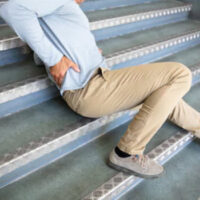Slip and Fall Accident Law: What is Constructive Knowledge?

In Florida, businesses and property owners must keep their premises free from unreasonable safety defects and hazards. If they fail to do so, they can be held responsible for any resulting injuries through a premises liability lawsuit. Slip and fall accidents are among the most common types of premises liability claims filed in Florida.
To bring a successful slip and fall accident lawsuit, a plaintiff must prove that the defendant had actual or constructive knowledge of the safety hazard. You may be wondering: What is constructive knowledge? Here, our Miami personal injury lawyers answer the question by explaining the most important things you need to know about constructive knowledge under Florida law.
Constructive Knowledge is Presumptive Knowledge (Knew or Should Have Known)
In some cases, slip and fall accident victims can prove actual knowledge. As an example, a property owner may admit that they were aware of a safety hazard during a deposition. However, in many other cases, property owners try to deny any knowledge of a property defect. This creates a potential challenge for injured victims: it is inherently difficult to prove that someone actually knew something when they vigorously deny it.
Fortunately, Florida law addresses this challenge. Slip and fall accident victims are not required to prove actual knowledge to recover financial compensation for their injuries. Instead, a plaintiff in a slip and fall claim only needs to establish that the defendant likely knew or should have known about the safety hazard. This is often referred to as having constructive knowledge. Simply defined, constructive knowledge covers all of the knowledge that the defendant would have had with proper due diligence.
Florida Slip and Fall Liability: Proving Constructive Knowledge
As noted above, it is easier to prove constructive knowledge than it is to prove actual knowledge. Still, constructive knowledge is not automatic. Slip and fall accident victims still need to bring a strong, well-supported legal case to recover financial support.
In general, constructive knowledge cases involve a great deal of circumstantial evidence. For example, under Florida Statutes § 768.0755, constructive knowledge may be based on the amount of time that a dangerous condition was present on the premises.
The bottom line: Businesses and property owners have a legal responsibility to conduct proper due diligence. If they fail to conduct adequate due diligence, they can still be held responsible even without actual knowledge. In slip and fall injury claims, businesses are liable for what they should have known.
Call Our Miami, FL Premises Liability Attorney for Help With Your Case
At Pike & Lustig, LLP, our Florida personal injury lawyers have deep experience handling complex slip and fall accident cases. If you have questions about proving constructive knowledge, our legal team is more than prepared to help. Call us today for a free, no obligation initial consultation. We handle premises liability claims throughout South Florida, including in Miami, Miami Beach, Hialeah, Fort Lauderdale, West Palm Beach, Palm Beach Gardens, Boca Raton, and Jupiter.
https://www.turnpikelaw.com/who-is-liable-for-a-student-athletes-injury-in-florida/
